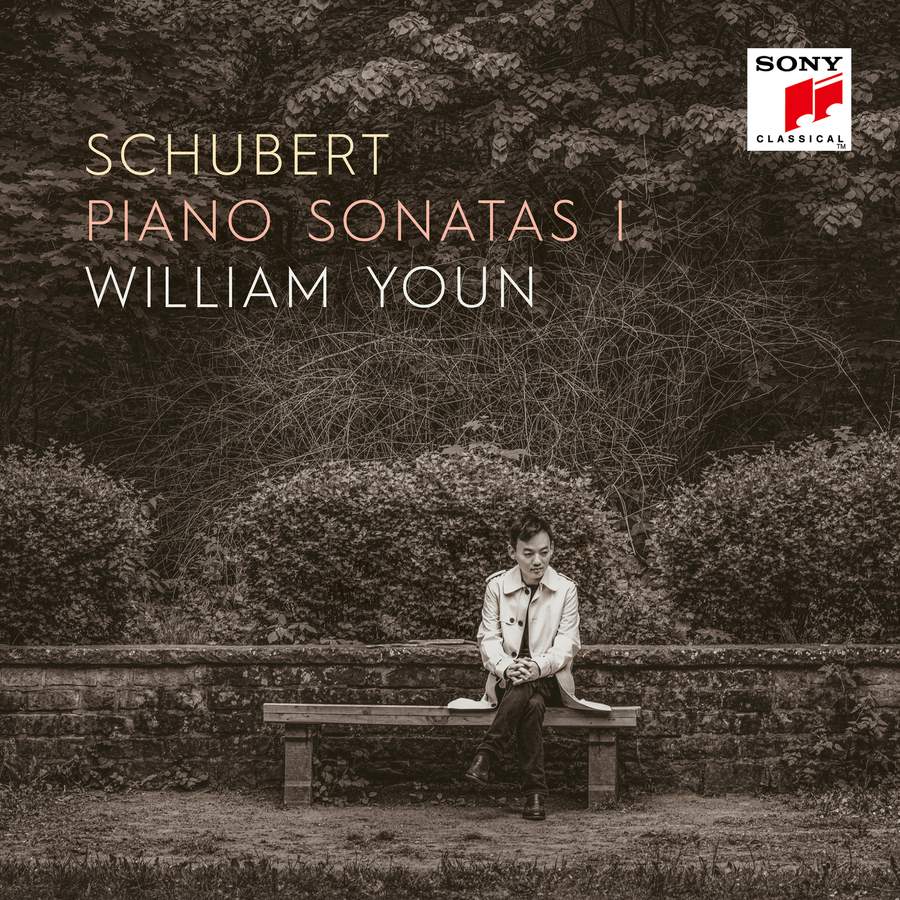SCHUBERT Piano Sonatas (William Youn)
View record and artist detailsRecord and Artist Details
Genre:
Instrumental
Label: Sony Classical
Magazine Review Date: AW20
Media Format: CD or Download
Media Runtime: 124
Mastering:
DDD
Catalogue Number: 19439 78414-2

Tracks:
| Composition | Artist Credit |
|---|---|
| Sonata for Piano No. 21 |
Franz Schubert, Composer
William Youn, Piano |
| Sonata for Piano No. 1 |
Franz Schubert, Composer
William Youn, Piano |
| Sonata for Piano No. 13 |
Franz Schubert, Composer
William Youn, Piano |
| Sonata for Piano No. 14 |
Franz Schubert, Composer
William Youn, Piano |
| Sonata for Piano No. 8 |
Franz Schubert, Composer
William Youn, Piano |
| Andante |
Franz Schubert, Composer
William Youn, Piano |
| Scherzo and Allegro |
Franz Schubert, Composer
William Youn, Piano |
Author: Harriet Smith
William Youn first made an impression on me with his Mozart sonatas for Oehms; and in 2018 I much enjoyed his subsequent mixed recital for Sony. That included Schubert and here he launches a complete sonata cycle, beginning at the end, with D960. The opening movement sets off at a pace that is, like the musical equivalent of the Three Bears, neither too slow nor too fast but just right. It’s in marked contrast to the recent D960 of another Sony artist, Khatia Buniatishvili, with none of her ‘look at me’ posturing that so distracted. With Youn, you’re in safe hands and points such as the shift to the development (from 10'14" – he includes the exposition repeat) are marked by a quiet conviction that is most involving. In the Andante sostenuto he conveys a sense of barely concealed angst that is very telling. Occasionally he underplays the emotional effect where Schubert recolours a phrase through a shift in harmonies, but it’s a relatively small quibble. The Scherzo, while suitably ethereal, doesn’t have the sense of desperation that you find in Uchida or the sheer skittering energy of Lupu, and in the end seems just a tad too reined in. The finale (again, very well paced) is full of finesse, more veiled in tone than Lupu, though some of its darker aspects could have been brought out more, not least the left-hand octave G heard at the outset.
Youn is very much at home in the incomplete early E major Sonata, D157, launching into its opening bars with a ringing sense of confidence before bringing out its playfulness. Lupu is just a tad steadier here, though every bit as exuberant. It was composed when Schubert was just 18 and is full of unexpected turns, not least the dramatic development section, which Youn imbues with plenty of fire, while the aria-like second movement is full of pathos, though Volodos fills this with an even more bittersweet yearning. Also very striking is the Menuet, in which Youn combines a muscular energy with a sense of dance at a madcap tempo close to Lupu’s.
Youn brings to the winsome opening movement of D664 his characteristic sensitivity and there’s plenty of crystalline beauty in the higher-lying passages. He’s equally alive to the darker moments, fleeting though they are. Uchida takes more liberties here in terms of rubato, not necessarily to better effect. His experience as a fine Mozartian stands him in good stead in the pared-back Andante, to which he gives a quiet sense of gravity; the finale is a complete delight too, Youn very much at one with Schubert’s gentle sense of fun.
He also includes the composite sonata D571/604/570. With the best will in the world, this is not exactly top-drawer Schubert (as the composer perhaps realised, leaving the first movement, with its over-reliance on its main motif, unfinished only to be completed by others). Its chordal Andante sounds less suited for keyboard than a string quartet; most successful is the Scherzo, by turns charming and dramatic.
William Youn ends his recital with Schubert at his most steely and bleak in the vehement A minor Sonata, D784. Approaches to this sonata differ: with Uchida it’s her focus that grips, her pianissimos terrifying; Pires, on the other hand, contrasts an opening resignation with fury at the octave outbursts. Youn doesn’t capture the same level of intensity, though the lyrical major-key theme is beautifully voiced and the sense of narrative as the movement unfolds is unerring. But it does mean that his slow movement doesn’t stand in such great contrast (how wonderful Pires is here), its apparent balm shot through with elements of disquiet. The driving tarantella finale, though, is very well done, truly airborne, with Youn finding due contrast in the bracing martial theme and the more tender moments, ending with an apt vehemence.
Discover the world's largest classical music catalogue with Presto Music.

Gramophone Digital Club
- Digital Edition
- Digital Archive
- Reviews Database
- Full website access
From £8.75 / month
Subscribe
Gramophone Full Club
- Print Edition
- Digital Edition
- Digital Archive
- Reviews Database
- Full website access
From £11.00 / month
Subscribe
If you are a library, university or other organisation that would be interested in an institutional subscription to Gramophone please click here for further information.




